De Poolse schrijver en regisseur Tadeusz Konwicki werd geboren op 22 juni 1926 in Nowa Wilejka bij Vilnius. Zie ook mijn blog van 22 juni 2007 en ook mijn blog van 22 juni 2009.
Uit: A Minor Apocalypse (Vertaald door Richard Lourie)
„Here comes the end of the world. It’s coming, it’s drawing closer, or rather, it’s the end of my own world which has come creeping up on me. The end of my personal world. But before my universe collapses into rubble, disintegrates into atoms, explodes into the void, one last kilometer of my Golgotha awaits me, one last lap in this marathon, the last few rungs up or down a ladder that is without meaning.
I wake at the gloomy hour at which autumn’s hopeless days begin. I lay in bed looking at a window full of rain clouds, but it was really one great cloud resembling a carpet darkened with age. This was the hour for doing life’s books, the hour of daily accounting. At one time people did their accounts at midnight before a good night’s sleep, now they beat their breasts in the morning, woken by the thuds of their dying hearts.
There was blank paper close at hand, in the bureau. The nitroglycerine of the contemporary writer, the narcotic of the wounded individual. You can immerse yourself in the flat white abyss of the page, hide from yourself and your private universe, which will soon explode and vanish. You can soil that defenseless whiteness with bad blood, furious venom, stinking phlegm, but no one is going to like that, not even the author himself. You can pour the sweetness of artificial harmony, the ambrosia of false courage, the cloying syrup of flattery onto the vacant whiteness and everyone will like it, even the author himself.
Which way to turn in this last lap? To the bitter left or sweet right? The same cloud was still outside the window, or a collective of clouds made uniform. On long, thin legs the rain flitted across the rusted windowsill. Once there had been something there. Forms, colors, scraps of emotion in violent movement. My life, or somebody else’s. Most likely some made-up life. A collage of readings, incompletions, old films, unfinished fantasies, legends, dreams which did not come true. My life. A cutlet made of protein and cosmic dust.“
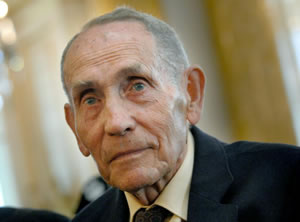
Tadeusz Konwicki (Nowa Wilejka, 22 juni 1926)
De Amerikaanse schrijfster en luchtvaartpionier Anne Morrow Lindbergh werd geboren op 22 juni 1906 inEnglewood, New Jersey. Zie ook mijn blog van 22 juni 2009.
Uit: Gift from the Sea
“The beach is not the place to work; to read, write, or think. I should have remembered that from other years. Too warm, too damp, too soft for any real mental discipline or sharp flights of spirit. One never learns. Hopefully, one carries down that faded straw bag, lumpy with books, clean paper, long over-due unanswered letters, freshly sharpened pencils, lists, and good intentions. The books remain unread, the pencils break their points, and the pads rest smooth and unblemished as the cloudless sky. No reading, no writing, no thoughts even – at least, not at first.
At first, the tired body takes over completely. As on shipboard, one descends into a deck-chair apathy. One is forced against one’s mind, against all tidy resolutions, back into the primeval rhythms of the sea-shore. Rollers on the beach, wind in the pines, the slow flapping of herons across sand dunes, drown out the hectic rhythms of city and suburb, time tables and schedules. One falls under their spell, relaxes, stretches out prone. One becomes, in fact, like the element on which one lies, flattened by the sea; bare, open, empty as the beach, erased by today’s tides of all yesterday’s scribblings.“
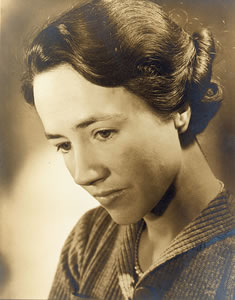
Anne Morrow Lindbergh (22 juni 1906 – 7 februari 2001)
De Duitse schrijver, dadaïst en architekt Johannes Baader werd geboren op 22 juni 1875 in Stuttgart. Zie ook mijn blog van 22 juni 2009.
Hölle
Die Rune hat recht. Ich kenne die Hölle.
Sie ist des Himmels treibendes Mittel und Herz.
Ohne das Schlagwerk der Hölle bliebe der Himmel
Blutlos und tot.
In Langweil und Müde verliefe die ewig getanzte Lust,
Ohne dass Würzung und Schürzung im Schürgang
Schüfe die Frischungsreihe der Not.
Ich segne die Hölle!
Aber sieghafter wirst du die Folter der Fessel zwingen,
So du gewohnt bist, im Dunkel der Fron zu wissen,
Dass du in der Quelle des Lichts
Und zwischen den Himmeln ruhst!
Wo des göttlichen unfassbare Majestät
Die wogende Heerzahl deiner Weltscharen erfüllt,
Deren eine einzige nur ihre schmale Spanne Bewußtsein
Mit Hölle, Trauer, Qual und Verzweiflung umhüllt.
Erst wenn das Wissen der Dichter,
Und aller Dichtung der Zeit,
In den Tempeln der Himmel den schaffenden Geist geweiht,
Werden ihrer Werke Gebäude Geschmeide und Kostbarkeit,
Und weben den Gliedern
In schimmernd schmiegender Seide
Das Hochzeitskleid.
Ehret die Frauen, sie flechten und weben
Himmlische Rosen ins irdische Leben
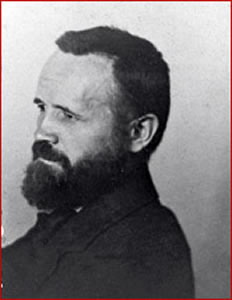
Johannes Baader (22 juni 1875 – 15 januari 1955)
De Duitse schrijfster Ida von Hahn-Hahn werd geboren op 22 juni 1805 in Tressow (Schlingendorf). Zie ook mijn blog van 22 juni 2009.
Lebenssonne
Kann das Aug’ dich nicht erspähen,
Wird es um mich Nacht und trübe,
Nebel um die Stirne wehen,
Es versinkt der Stern der Liebe;
Meine Sonne ist verdürstet,
Meine Rosen sind verblüht,
Und der Wind im Laube flüstert
Dumpf und hohl ein Trauerlied.
Kann die Hand dich nicht erreichen,
So verschweben die Gestalten,
Farb’ und Form von ihnen weichen,
Seelenlose Schatten walten,
Grau in Grau verschwimmt das Leben!
Ohn’ die Stralen meines Lichts,
Die das Weltenall durchbeben,
Ist mir Alles, Alles – Nichts.
Doch wenn mir die Gluten starben,
Senke ich den Blick nach innen;
Dort erblüht in tausend Farben
All mein Denken, all mein Sinnen;
Was in äußrer Welt verloren,
Giebt die inn’re mir zurück,
Gleich dem Phönix neu geboren,
Grüßt mich ewig neu das Glück.
Denn dein Wunderbild entschwindet
Nimmer aus der tiefsten Seele,
Wenn mein Auge es nicht findet,
Wacht es auf in Zauberhöhle,
Giebt der Phantasie die Pracht; – –
Und ein Traum von deinem Wesen,
Er verklärt die tiefste Nacht.
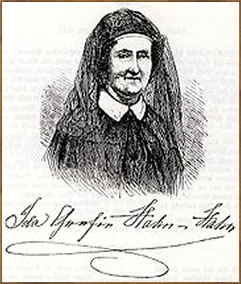
Ida von Hahn-Hahn (22 juni 1805 – 12 januari 1880)
De Franse dichter Jacques Delille werd geboren op 22 juni 1738 in Clermont-Ferrand. Zie ook mijn blog van 22 juni 2007en ook mijn blog van 22 juni 2009.
Les jardins (Fragment)
…Désirez-vous un lieu propice à vos travaux ?
Loin des champs trop unis, des monts trop inégaux,
J’aimerais ces hauteurs où, sans orgueil, domine
Sur un riche vallon une belle colline.
Là, le terrain est doux sans insipidité,
Élevé sans raideur, sec sans aridité.
Vous marchez : l’horizon vous obéit : la terre
S’élève ou redescend, s’étend ou se resserre.
Vos sites, vos plaisirs changent à chaque pas.
Qu’un obscur arpenteur, armé de son compas,
Au fond d’un cabinet, d’un jardin symétrique
Confie au froid papier le plan géométrique ;
Vous, venez sur les lieux. Là, le crayon en main,
Dessinez ces aspects, ces coteaux, ce lointain ;
Devinez les moyens, pressentez les obstacles :
C’est des difficultés que naissent les miracles.
Le sol le plus ingrat connaîtra la beauté.
Est-il nu ? que des bois parent sa nudité :
Couvert ? portez la hache en ses forêts profondes :
Humide ? en lacs pompeux, en rivières fécondes,
Changez cette onde impure ; et, par d’heureux travaux,
Corrigez à la fois l’air, la terre et les eaux :
Aride enfin ? cherchez, sondez, fouillez encore ;
L’eau lente à se trahir, peut-être est près d’éclore.
Ainsi, d’un long effort moi-même rebuté,
Quand j’ai d’un froid détail maudit l’aridité,
Soudain un trait heureux jaillit d’un fond stérile,
Et mon vers ranimé coule enfin plus facile.
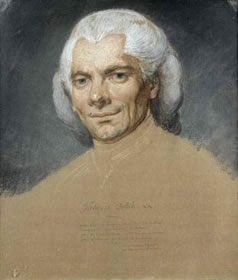
Jacques Delille (22 juni 1738 – 1 mei 1813)
Portret door Joseph Ducreux
